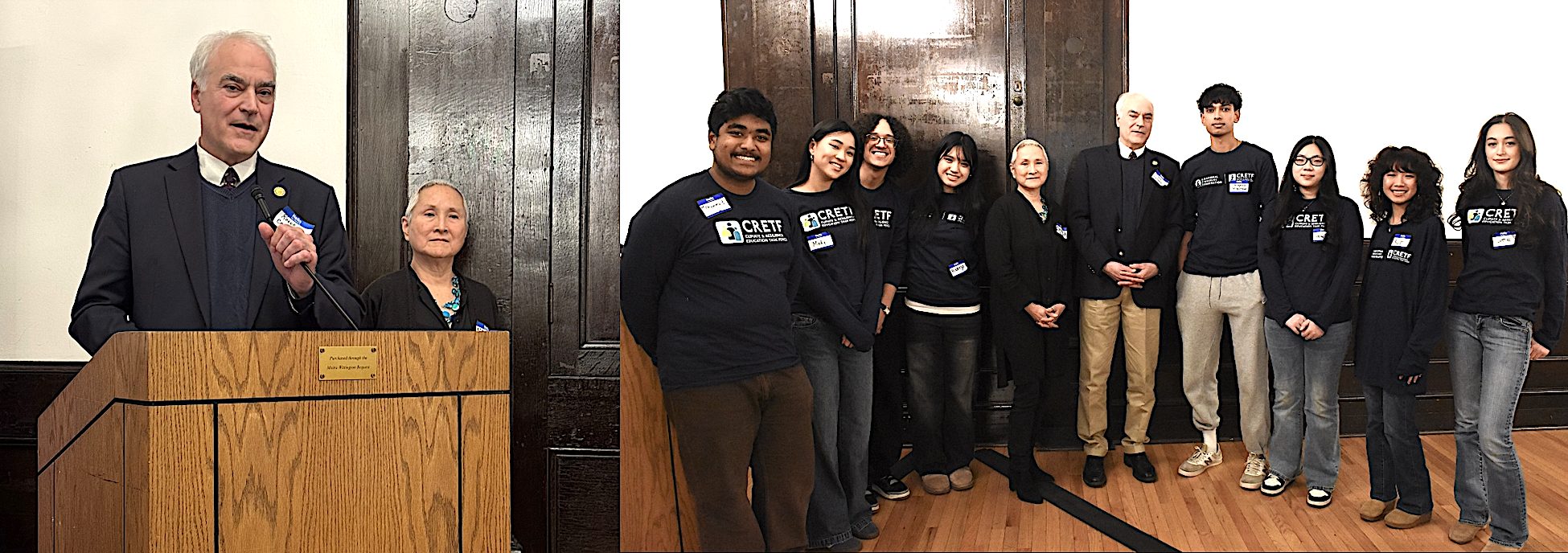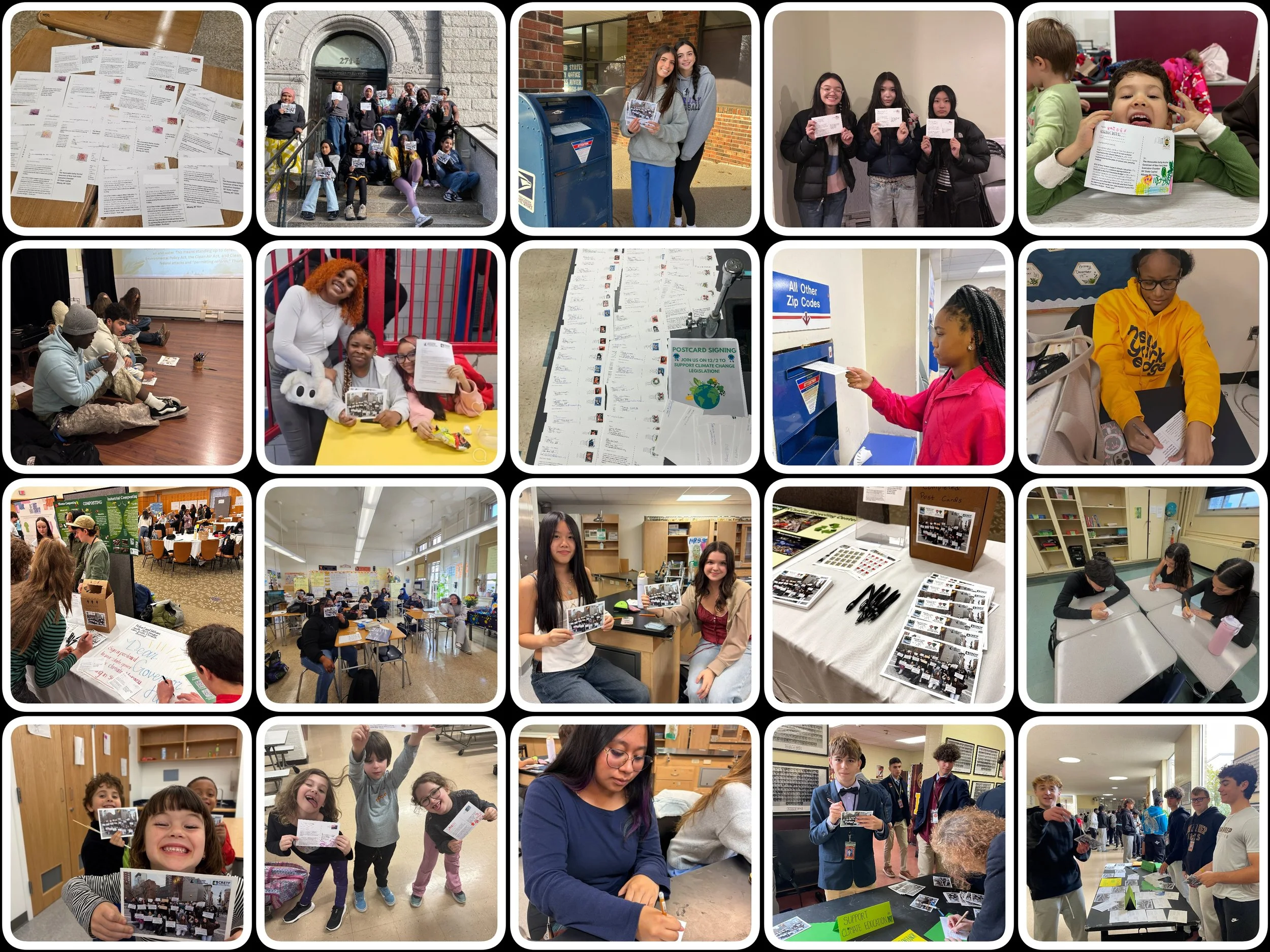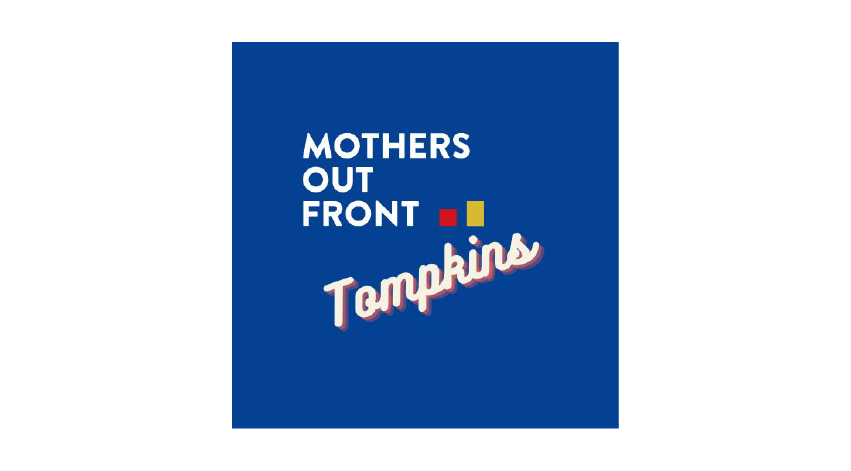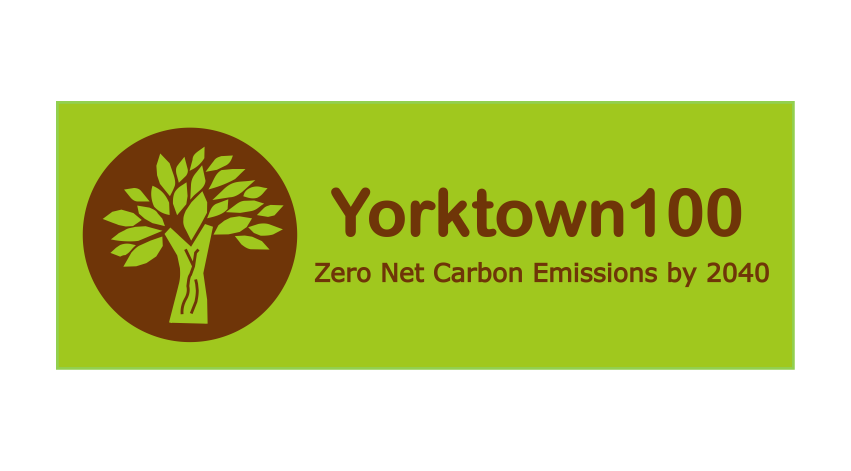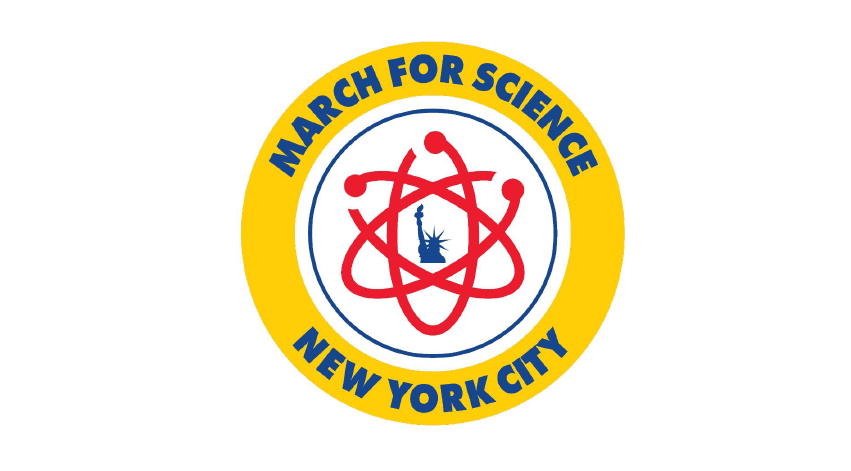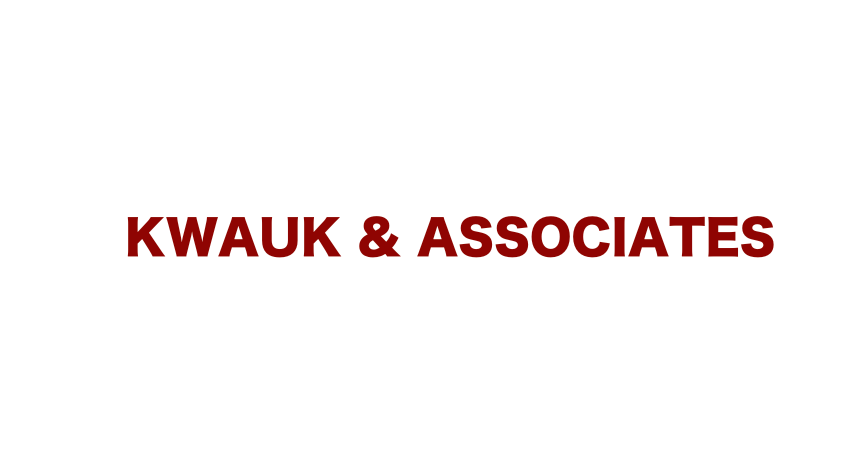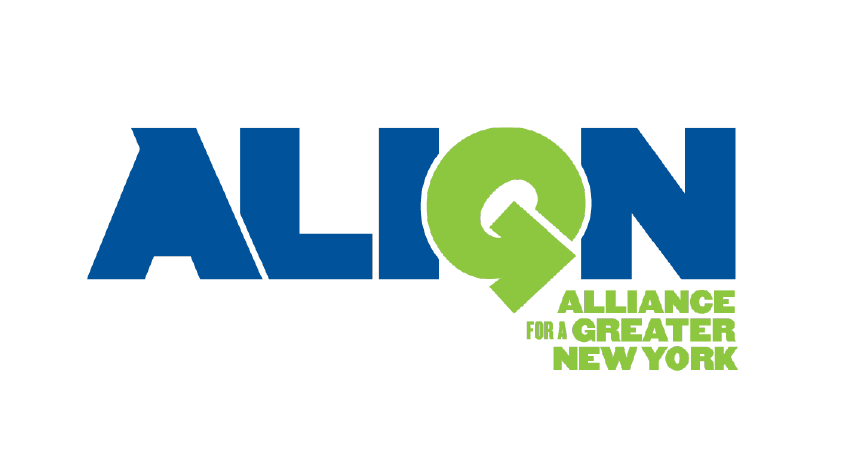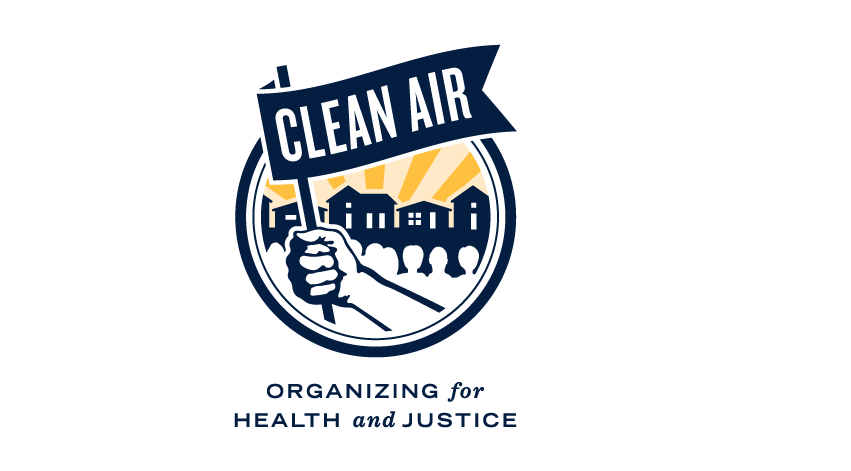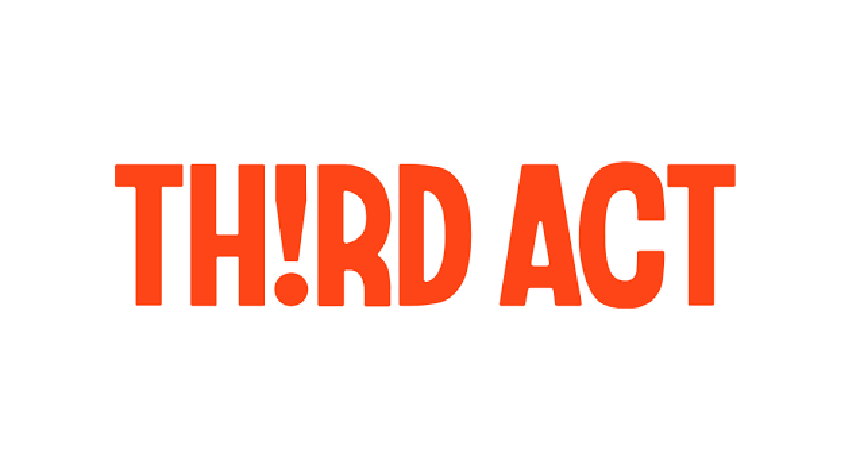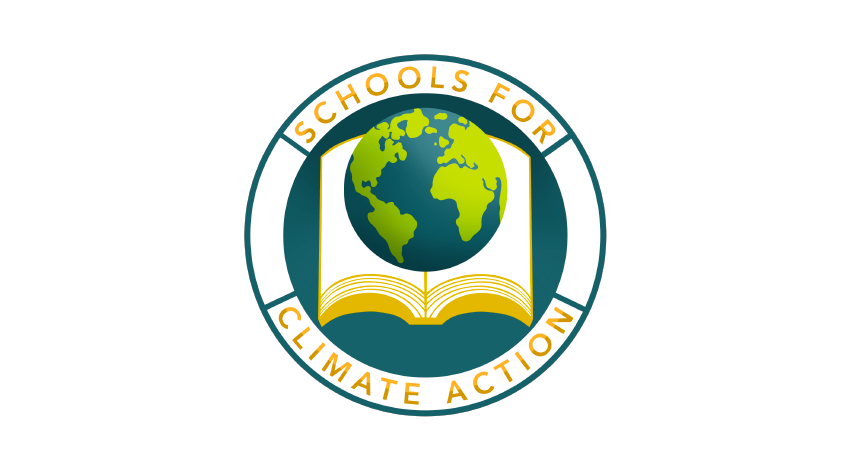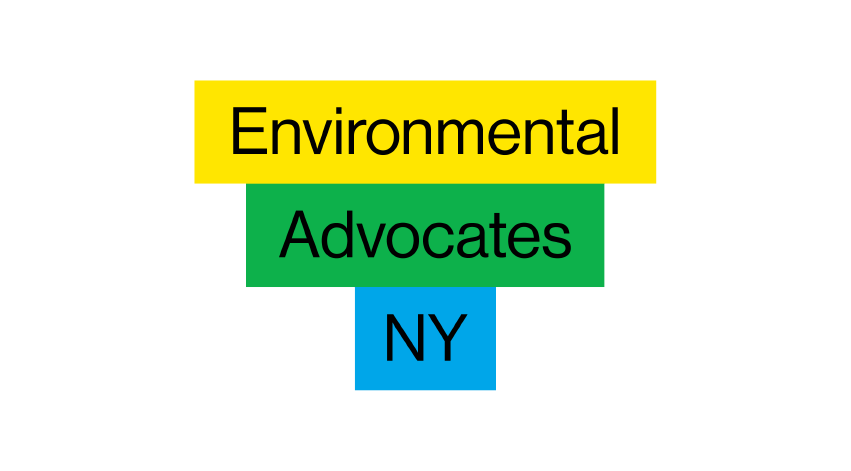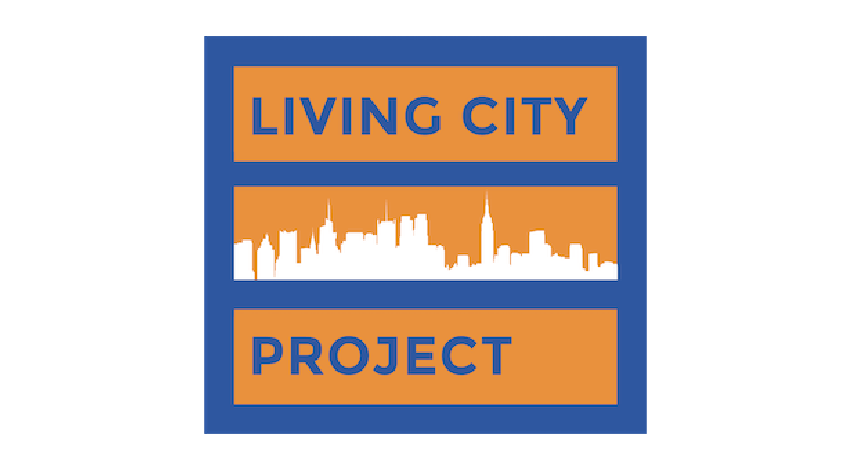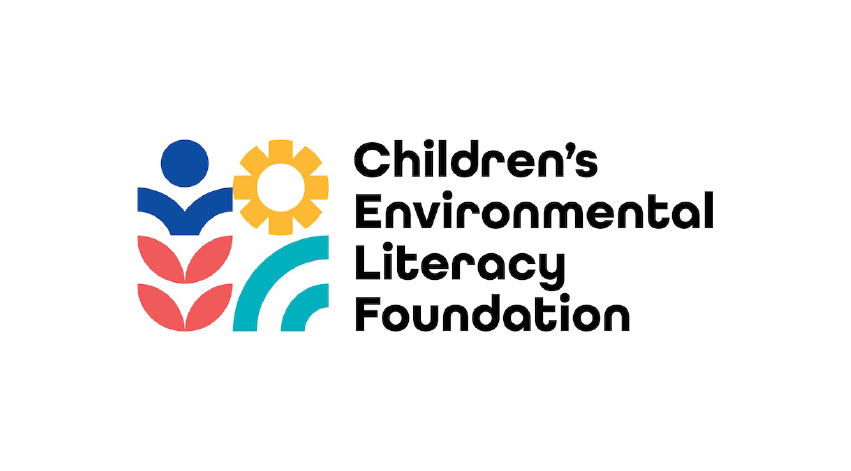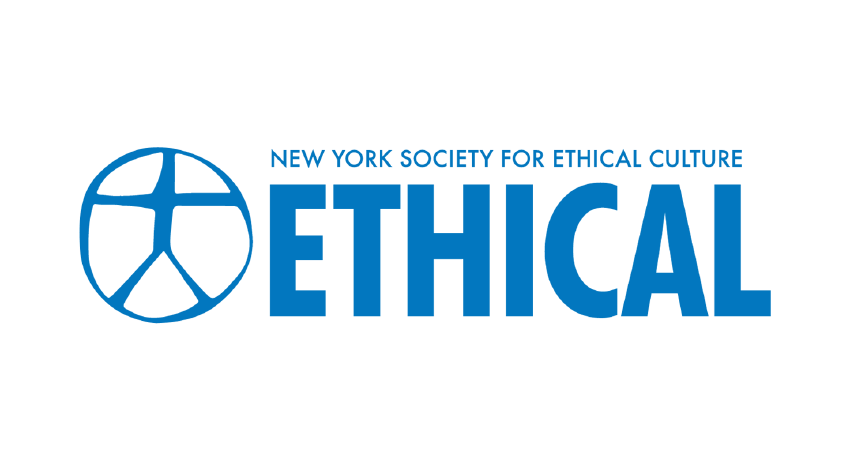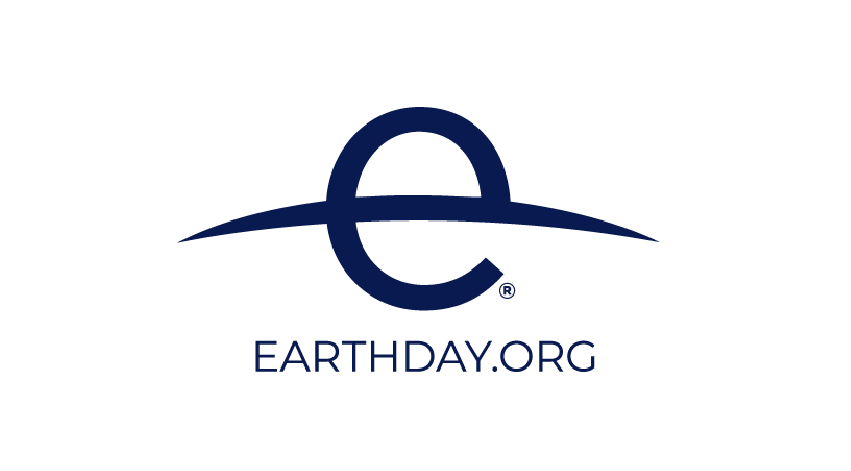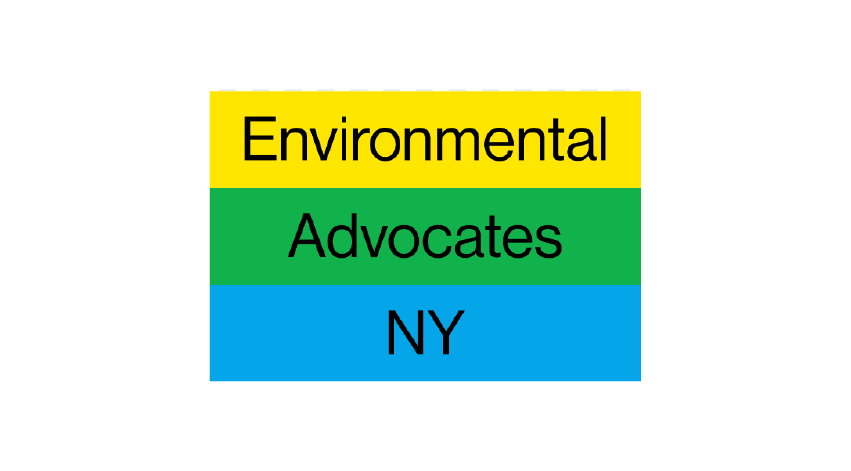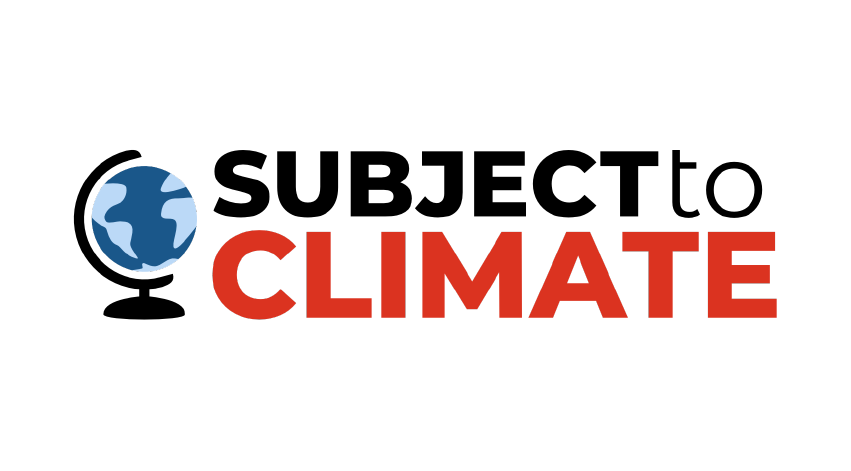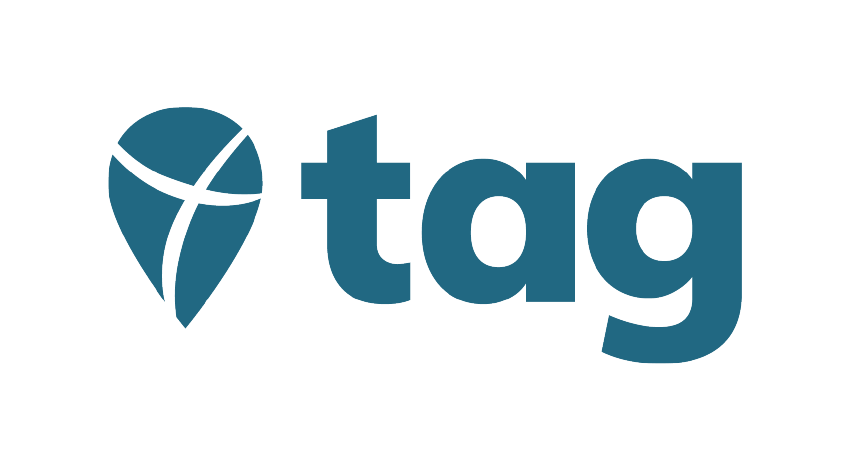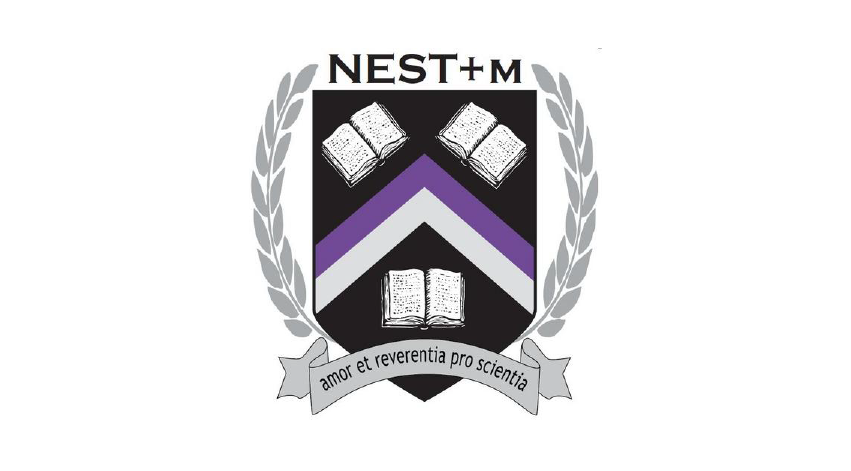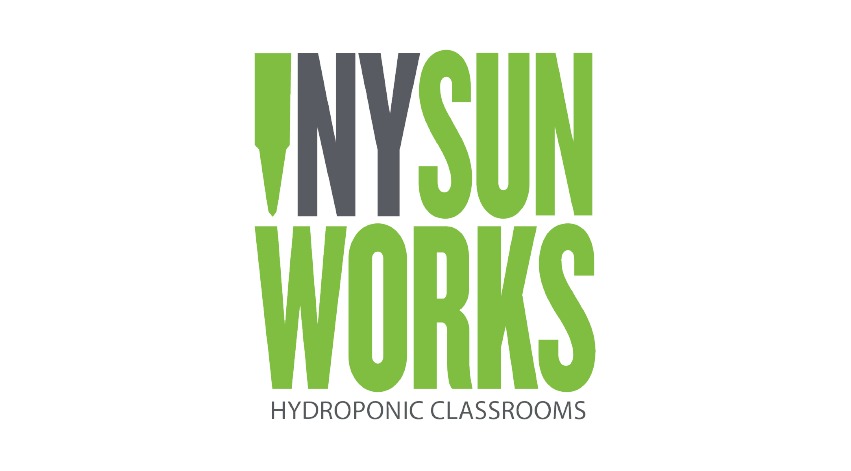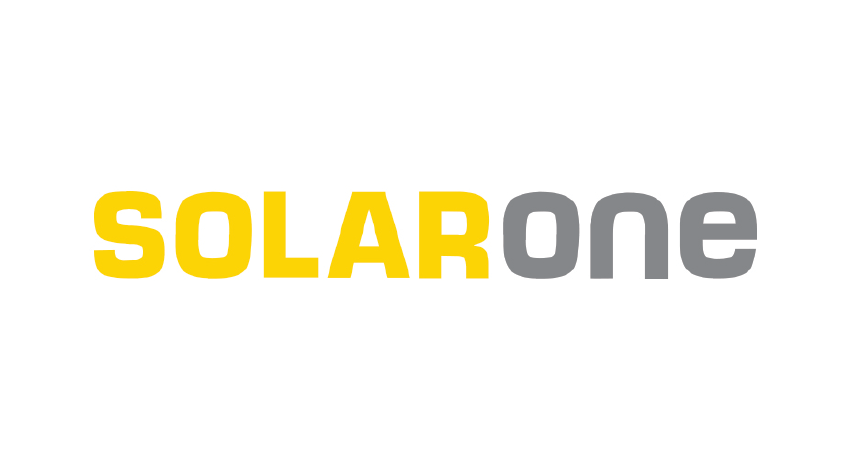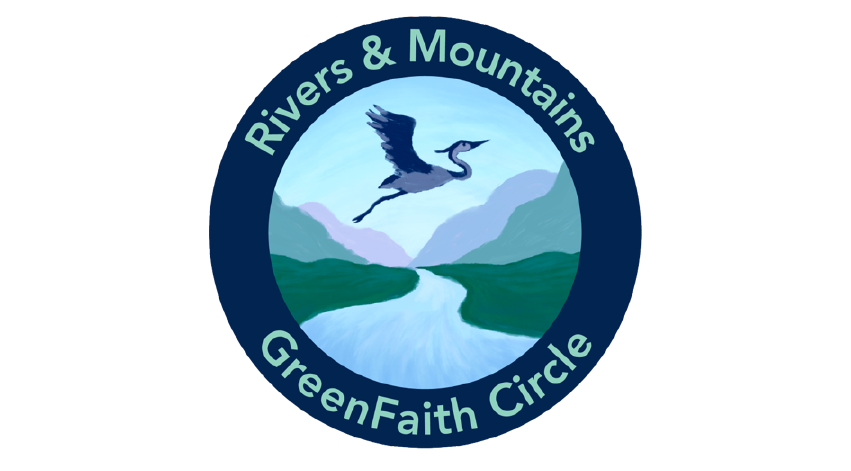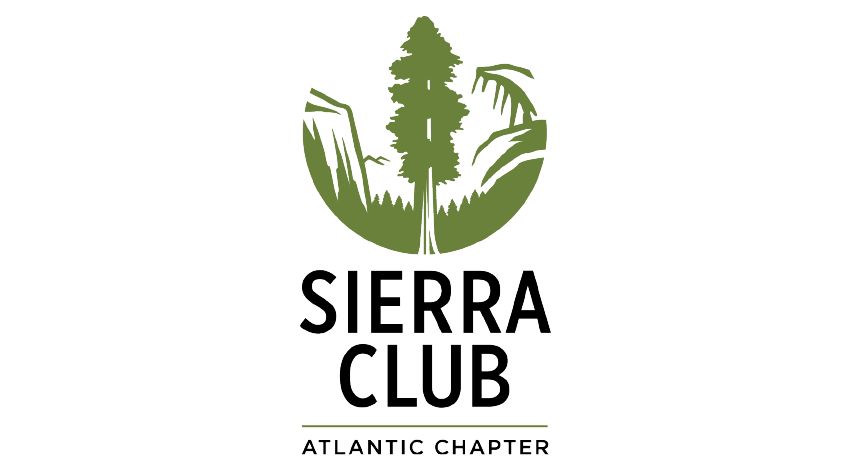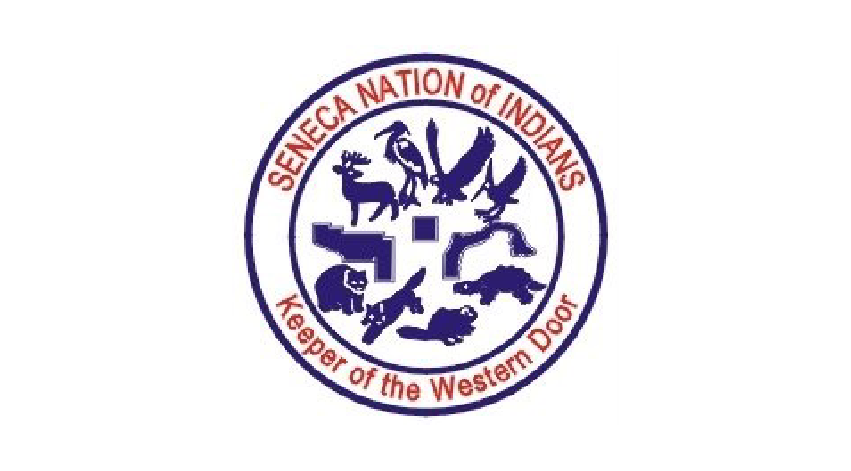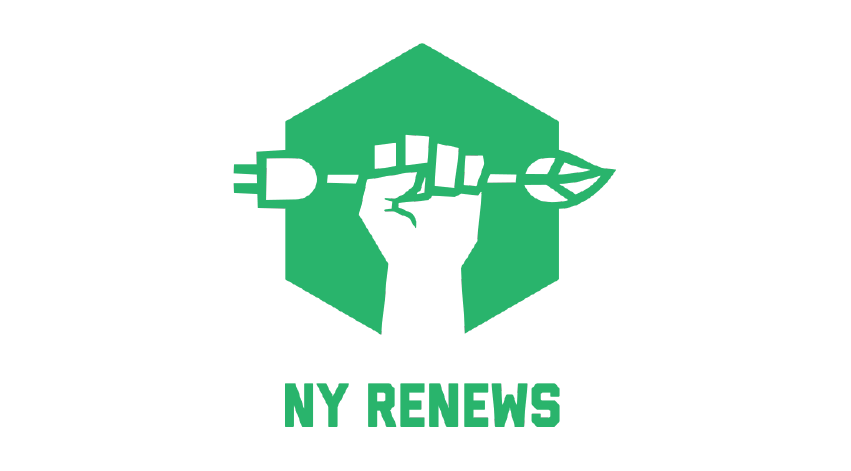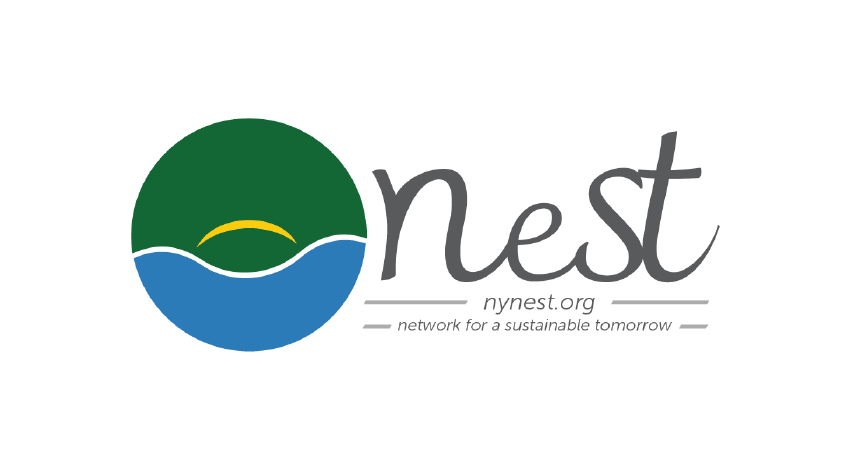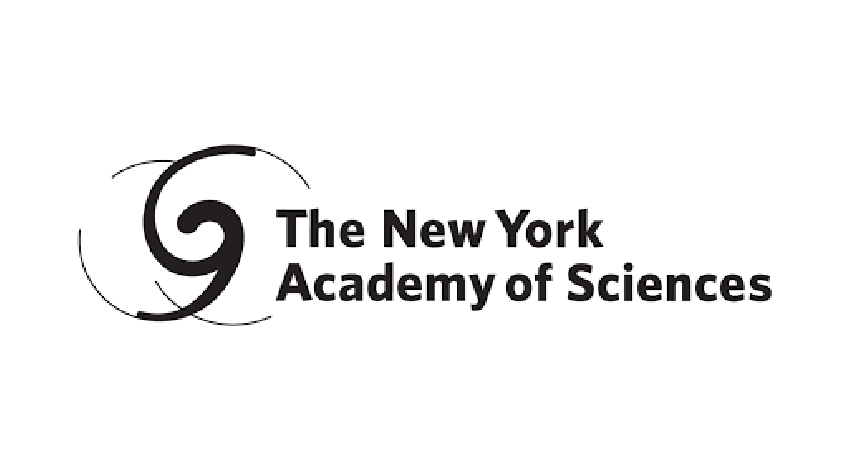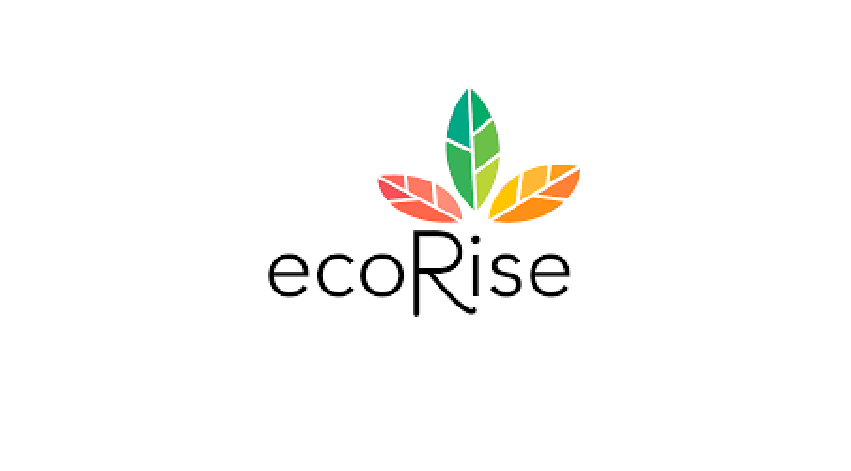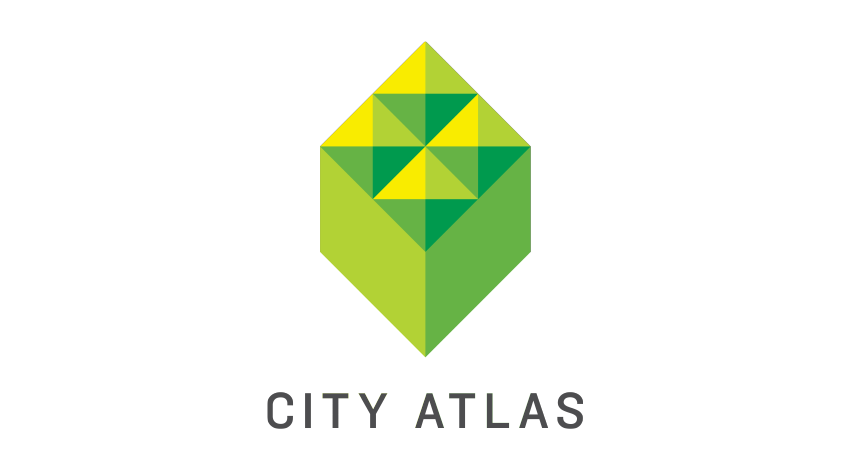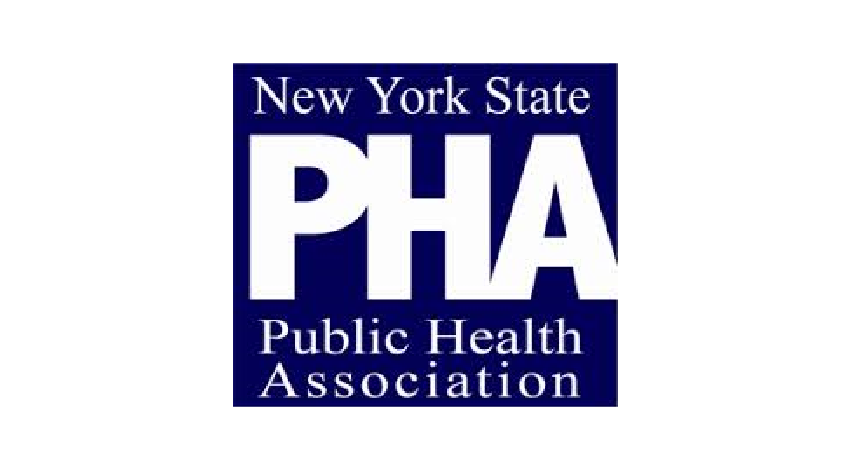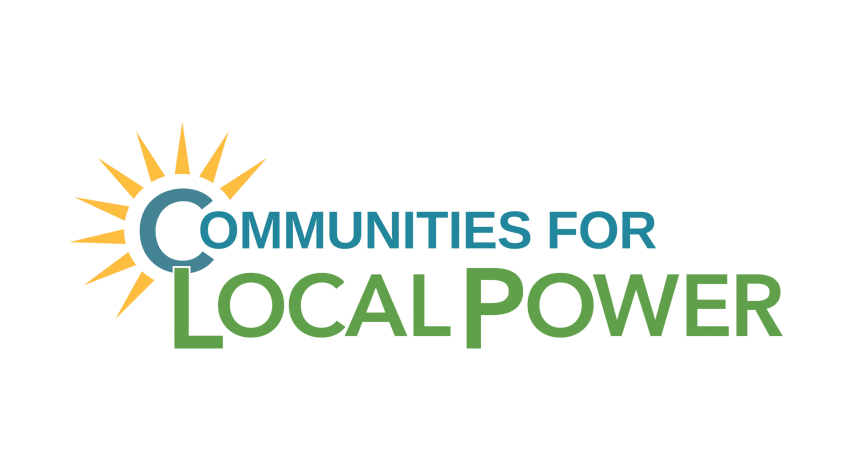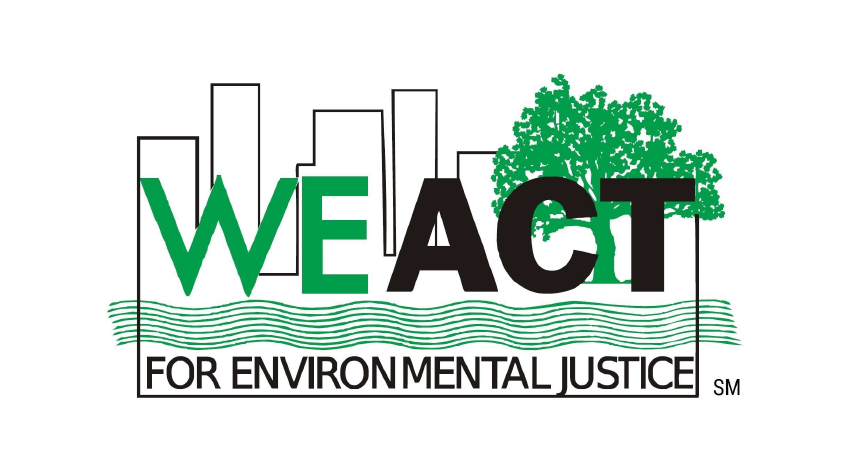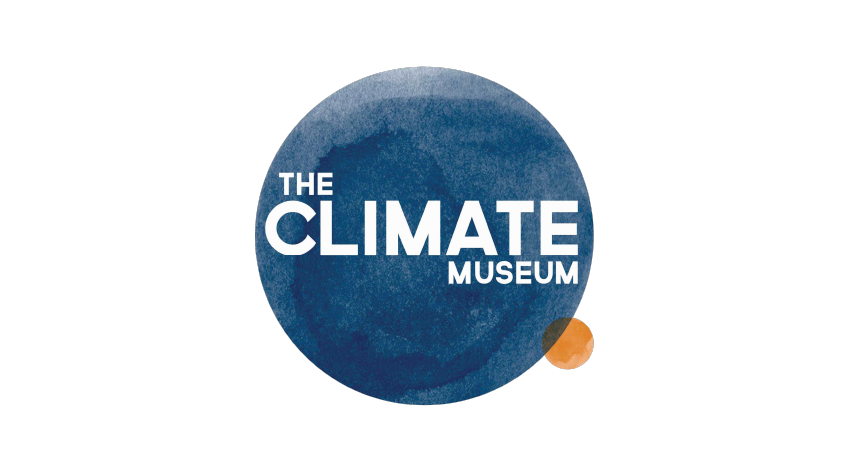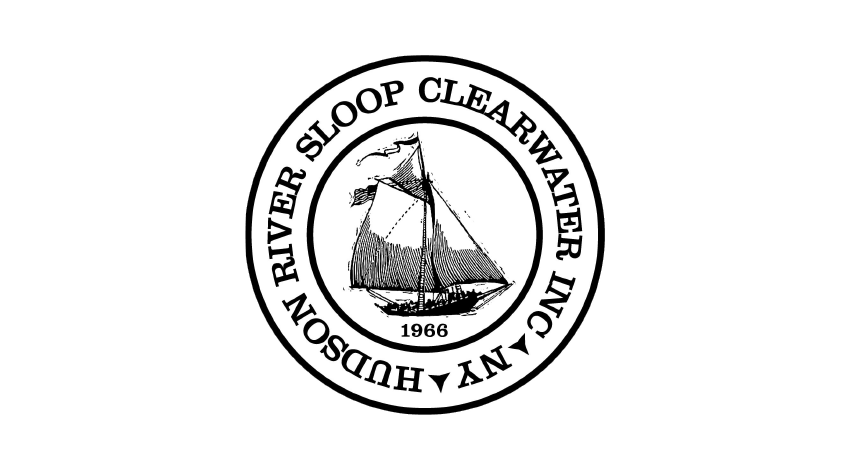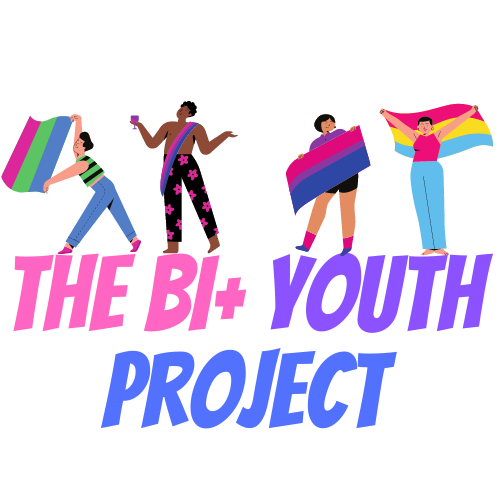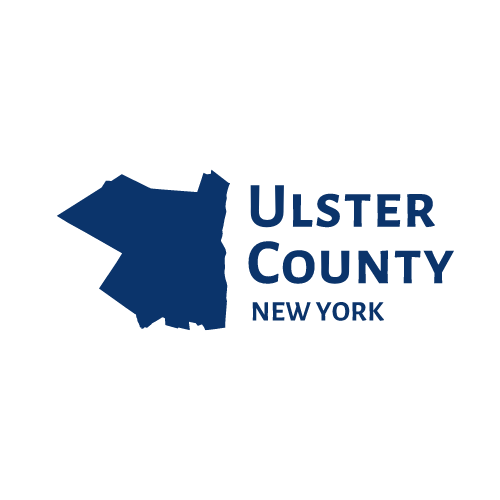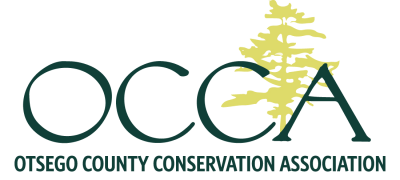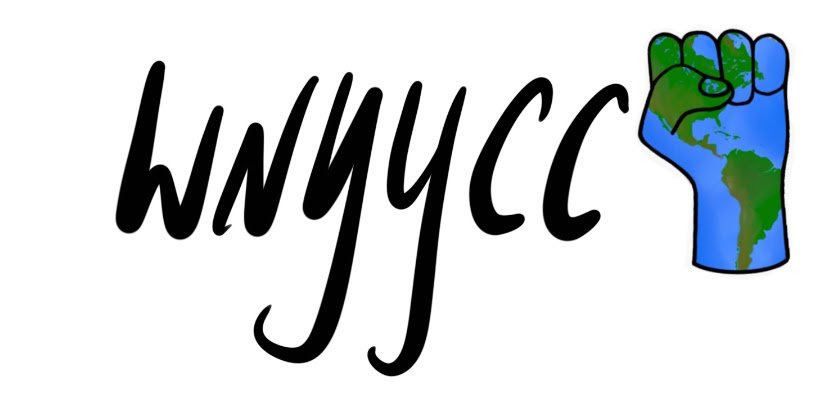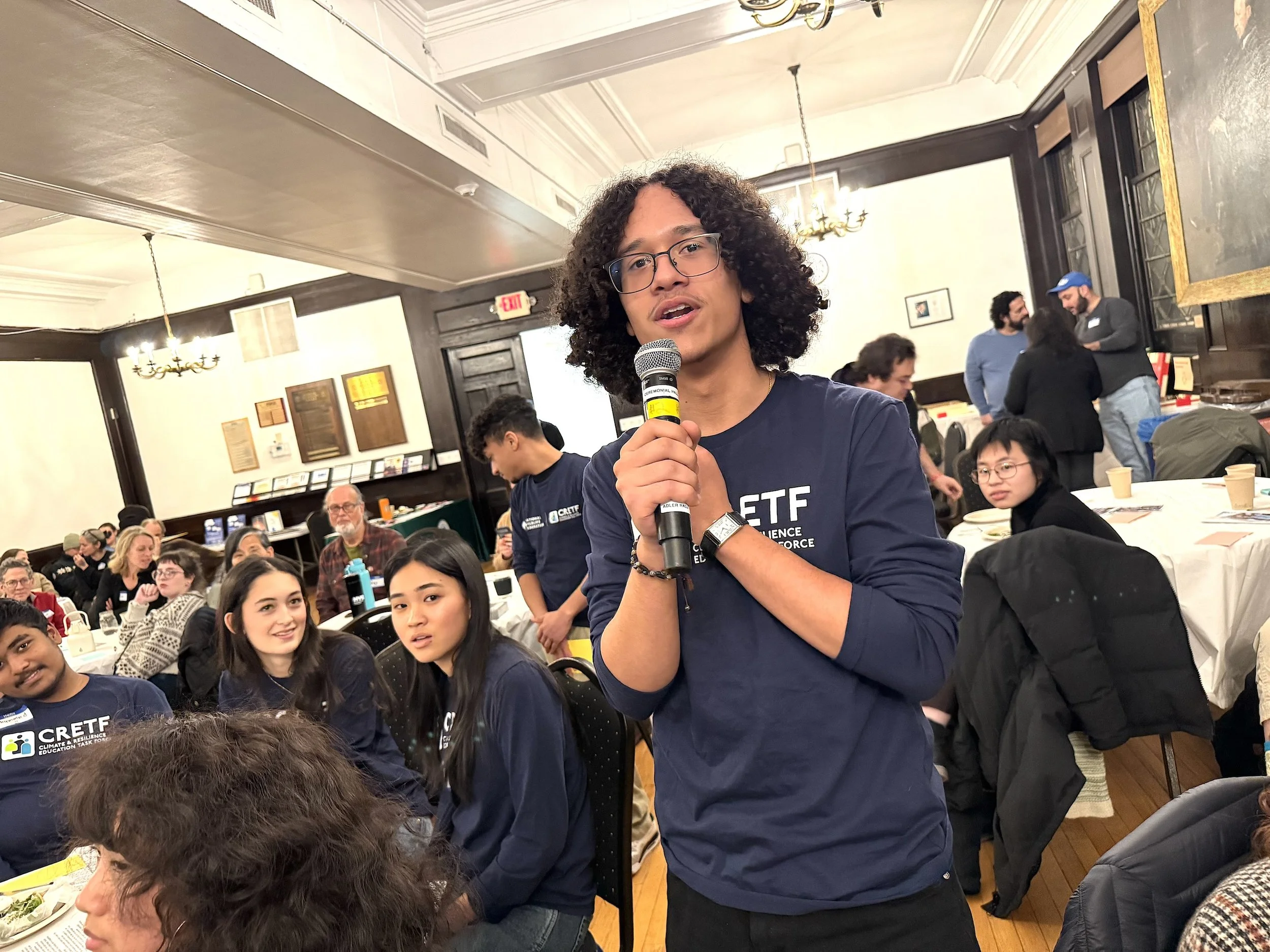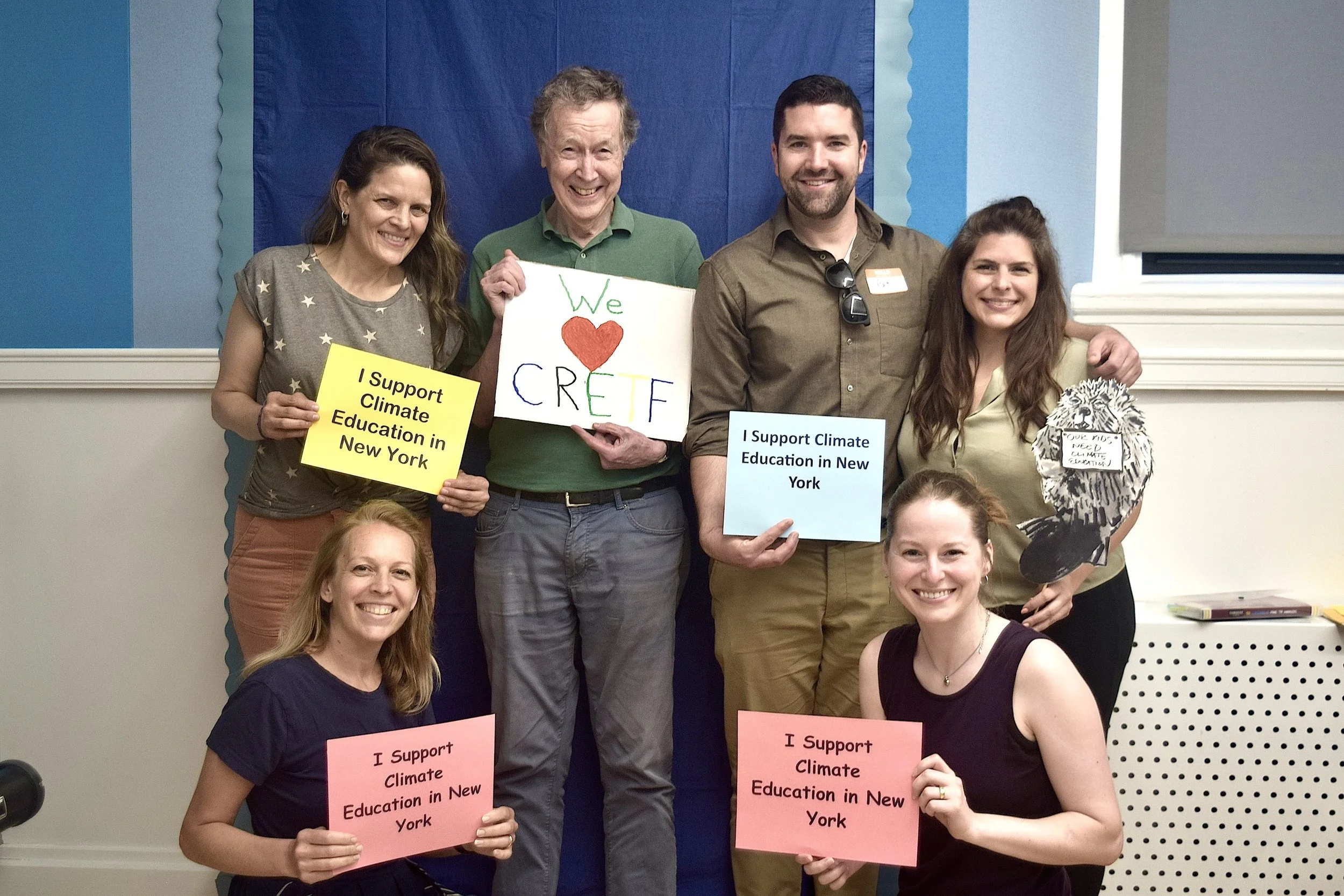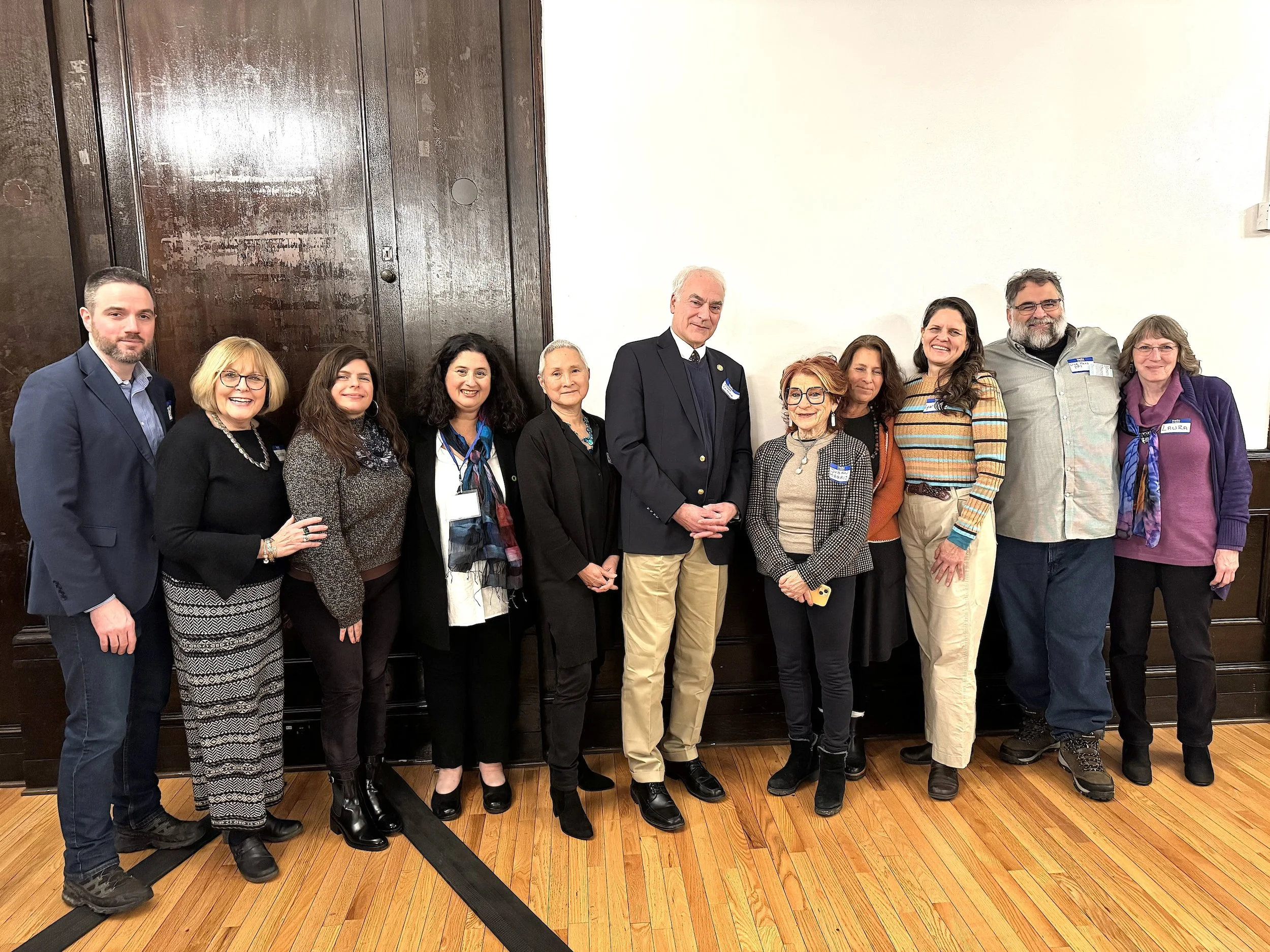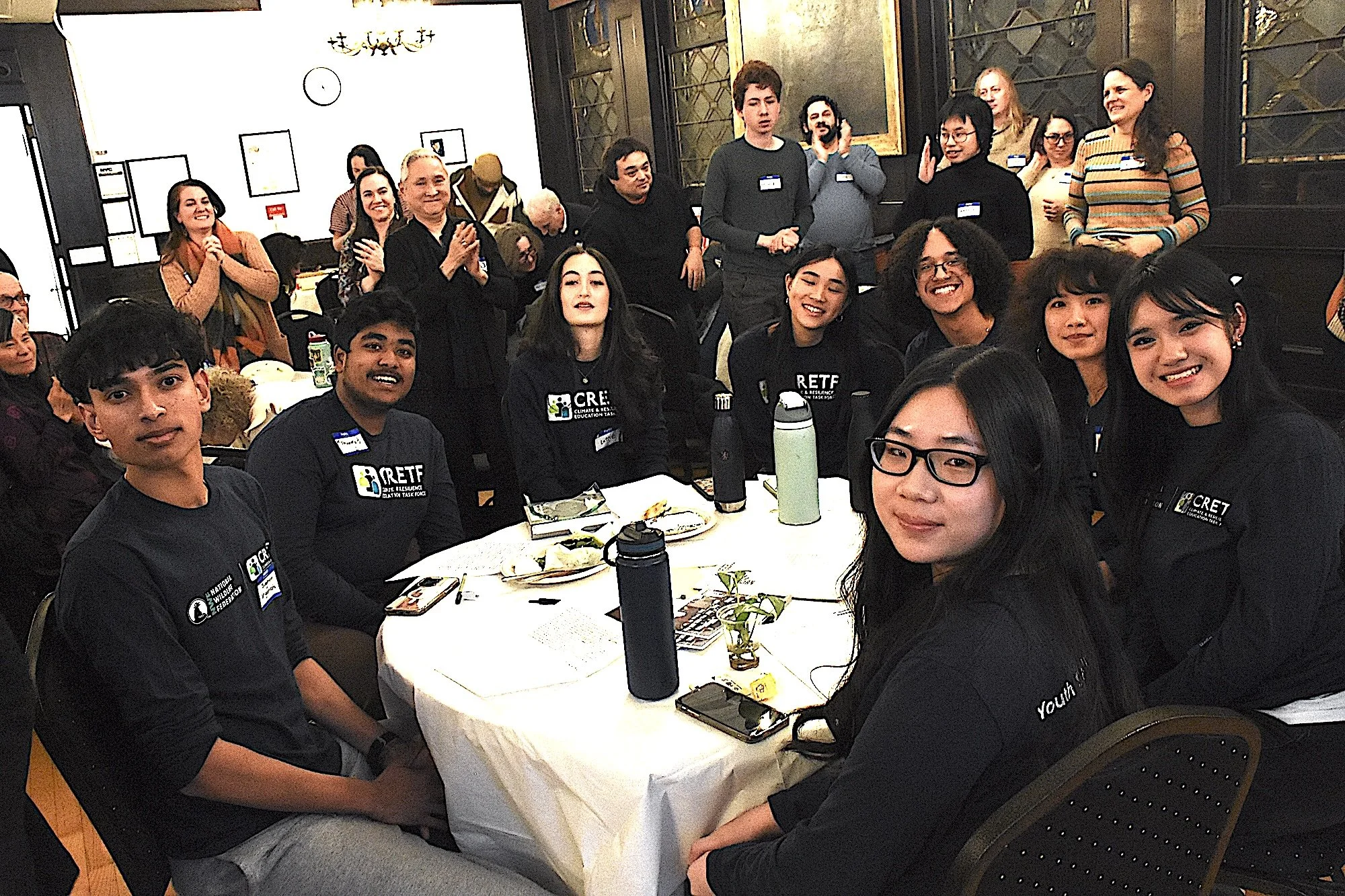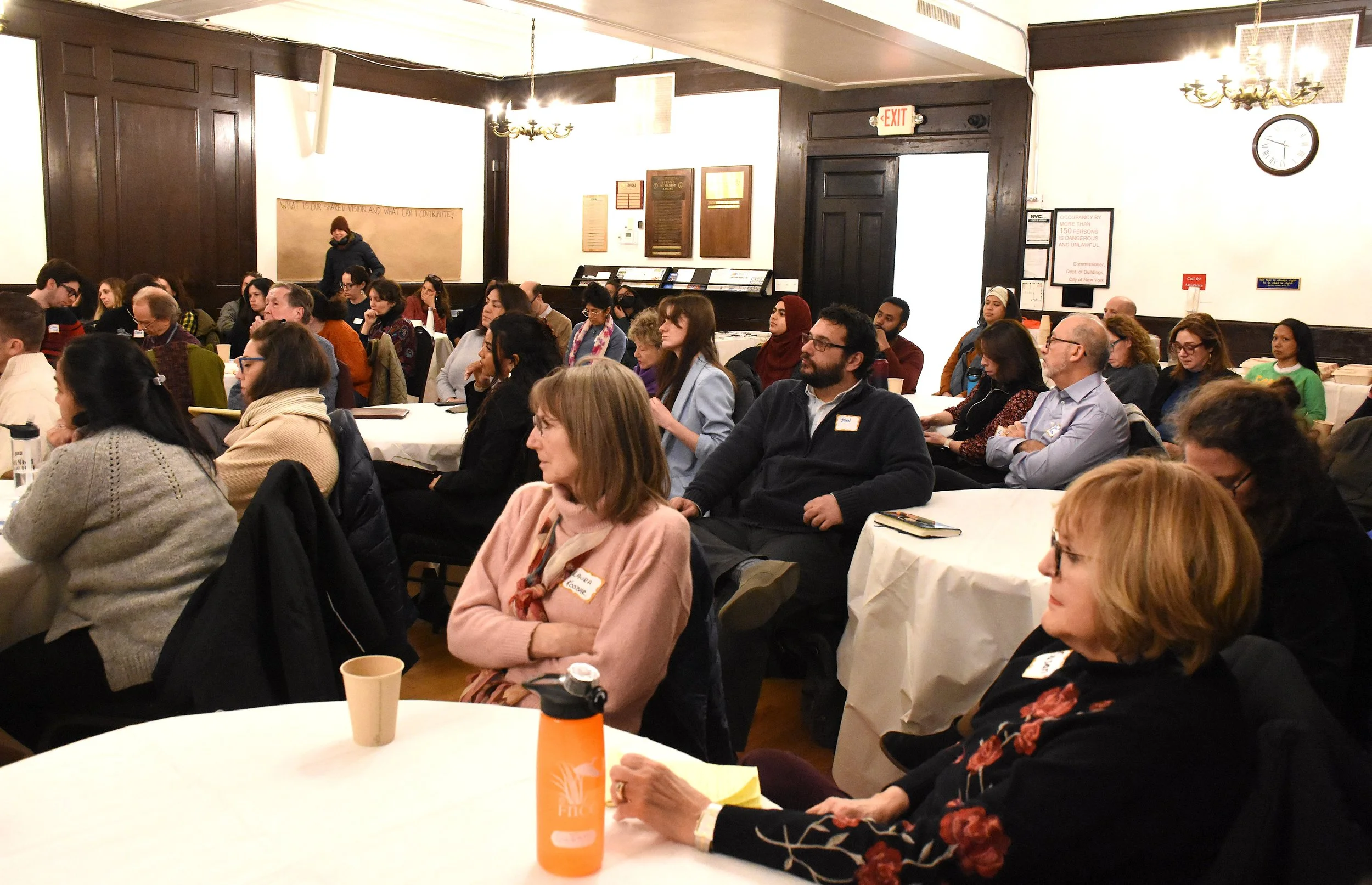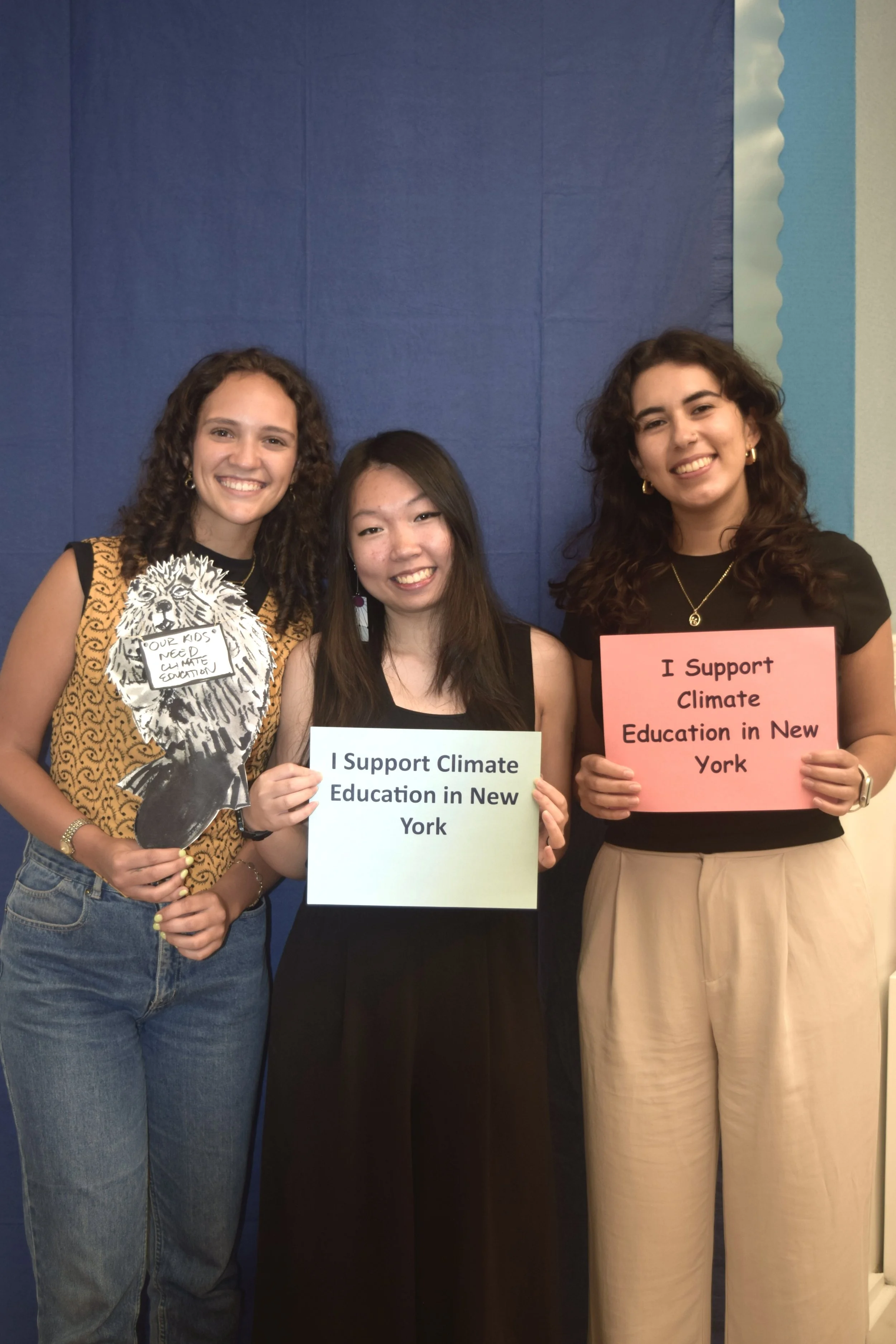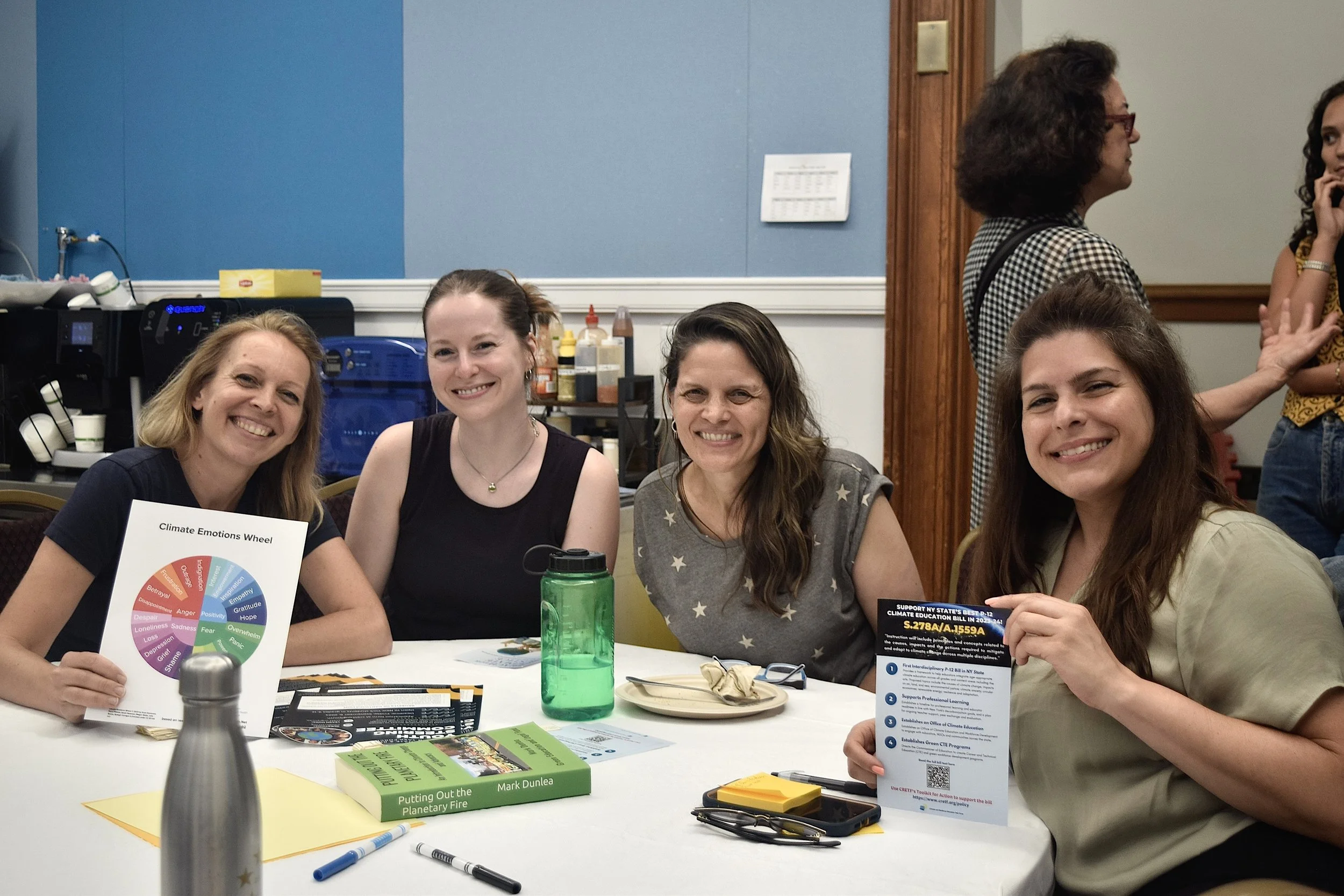Policy
Representatives of the NY Board of Regents attended CRETF’s in-person gathering on January 16, 2026 and were thanked for supporting climate education. Students presented small awards on behalf of CRETF and also delivered speeches about how their engagement with the Youth Steering Committee has impacted their personal and professional development and ignited their passion for policy, environmental issues, and civic advocacy. Photos: Cynthia Carris Alonso
On November 19, 2025, the New York Board of Regents published a proposed amendment of section 100.2 of the Regulations of the Commissioner of Education to require instruction in climate education. CRETF submitted 7 pages of comments to NYSED and mobilized students, formal and informal educators, parents, administrators, professional associations, NGO organizations and other members of the public to submit public comments to the agency by the January 19, 2026 deadline.
In March 2026, the Board of Regents will consider public comments and vote on the proposed amendment. A majority of New Yorkers (83%) support climate education.
Policy
Throughout the fall and winter of 2025 and early 2026, CRETF collaborated with 45 schools and organizations to mail 3,500 postcards to Governor Kathy Hochul asking her to include a modest appropriation of $536,500 in the FY27 Executive Budget so New York's 2.4 million P-12 students can receive quality, interdisciplinary climate education. This FY27 allocation would support NYSED to develop resources and guidance for New York teachers so they can be prepared to teach their students about the causes, impacts and solutiions to the climate crisis. Hundreds more New Yorkers submitted comments through the Governor’s portal and contacted several relevant lawmakers to make the same request.
We thank the students, educators and partners - some of whom are pictured below - who took the time to engage in our campaign.
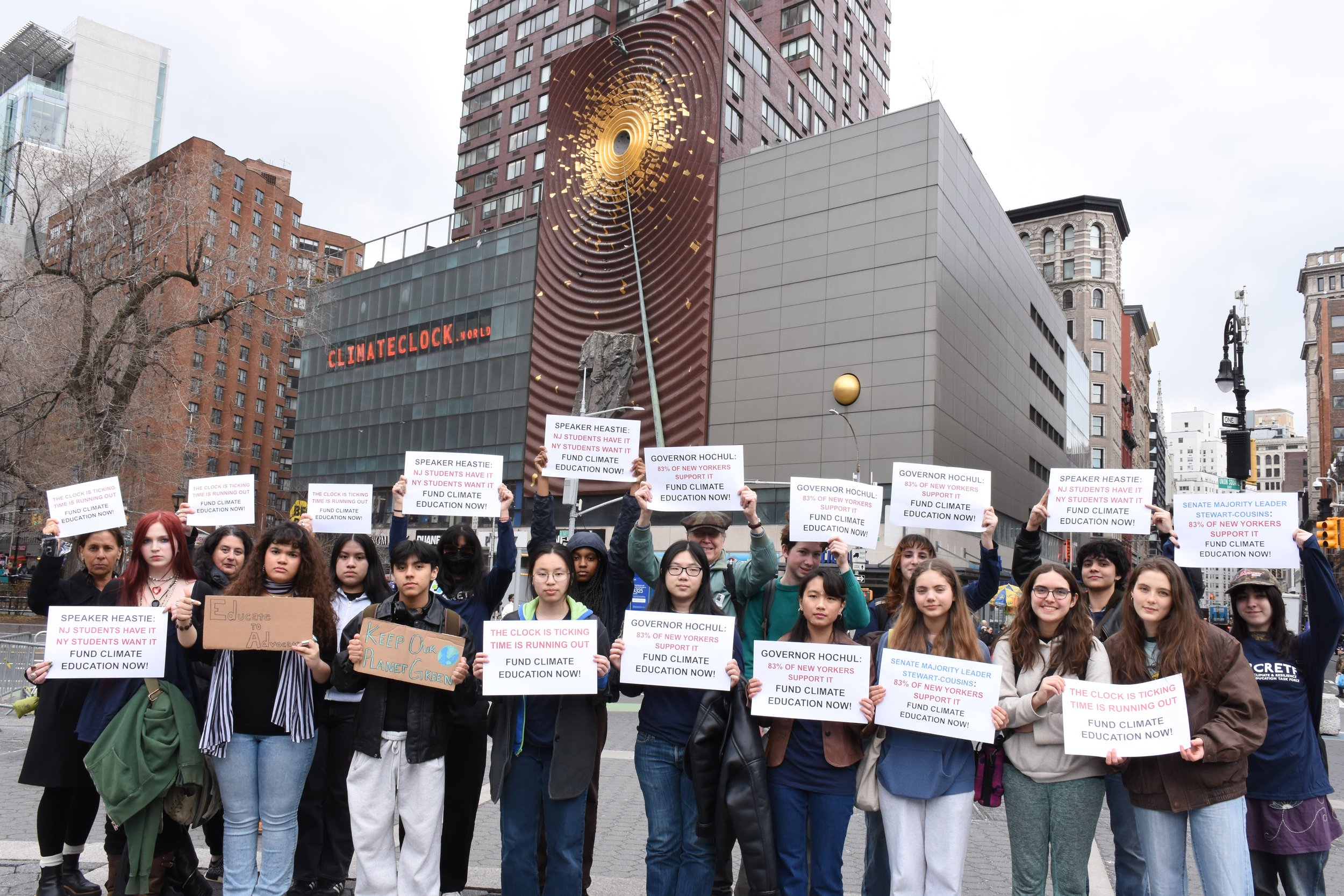
NYC students at the Climate Clock in NYC’s Union Square, March 26, 2025. Their message: “The clock is ticking, time is running out. Fund climate education now.” Photo: Cynthia Carris Alonso
It’s high time that our leaders recognize that climate education is foundational to meeting our state climate goals. It is also a critical component of ensuring safety and resilience in the face of climate change. In the United States, 36 million children are exposed to double the number of heat waves compared to 60 years ago; 2024 was the hottest year on record, beating 2023 by by 0.18°F (0.10°C). The 10 warmest years since 1850 have all occurred in the past decade. Climate change-fueled extreme weather events and unnatural disasters continue to displace and traumatize children and impact their access to school and education.
In January 2025 in Los Angeles, wildfires destroyed or heavily damaged 9 schools and forced 1,000 to close, affecting more than 600,000 students across 26 districts and four counties, according to the California Department of Education. New York is not immune to wildfires. Firefighters in New York City responded to 225 brush fires in November 2024 and 122 across the state. A 2024 study in Nature Climate Change by Caitlin M. Prentice et al. found that global climate change has significantly affected education outcomes by “undermining cognitive performance, disrupting school access, and impairing cognitive development.” These impacts are magnified in disadvantaged communities.
As extreme weather events become more frequent and intense, it is vital that all New Yorkers understand the risks, prepare for potential hazards, and take proactive steps to protect themselves and their communities. Comprehensive climate education, from P-12 curricula to specialized training for professionals, empowers individuals with the knowledge to adapt to changing conditions, advocate for effective climate policies, and contribute to the resilience of their communities. This foundational education will help foster a climate-aware population, capable of responding to challenges like heatwaves, wildfires, flooding, and sea level rise, and will drive meaningful action toward a sustainable, resilient future for our state.
83%
of New Yorkers believe that schools should teach about climate change, its impacts and solutions
Yale Climate Opinion Maps, 2024
Percentage of NY State population that supports climate education, by county.
Click on image to enlarge
Background
CRETF analyzed climate education policy in New York and across the country over several years.
To best reflect our vision of a comprehensive statewide climate education program, in 2023, CRETF decided to draft a new climate education bill.
An intergenerational CRETF committee made up of high school students and education professionals drafted a bill alongside Senator Andrew Gounardes and his legislative team. It was introduced as S278A/A1559A by Gounardes in the Senate and JoAnne Simon in the Assembly in November 2023. While the bill didn’t pass it was the first time that a climate education bill garnered a significant number of co-sponsors in the Senate and the Assembly, thanks to CRETF’s advocacy, and it provided lessons learned for 2025.
In 2024-25 CRETF partnered with NYSED and the original sponsors on a new, very short bill, S2430/A4876, modeled after Illinois’s HB4895. Sadly the new bill was incorrectly perceived as a mandate and a curriculum bill, which are unpopular in the legislature, and it did not pass even though our neighbor New Jersey is requiring climate education for all its K-12 students.
-

Rapidly Increasing Temperatures
August 2024, was Earth’s hottest in NOAA’s 175-year climate record with many cities breaking all-time heat records. The first eight months of 2024 also ranked as the second-warmest year-to-date, according to NOAA’s National Centers for Environmental Information.
In New York, climate change is already producing an impact on natural systems, society and the state’s economy.
-

Climate Change Impacts
Extreme weather events are increasing in frequency and intensity, coastal and inland flooding is occurring more often, and the agricultural growing season is fluctuating.
Climate disasters cost the Northeast over $95 billion from 1980-2024.
-

Lack of Climate Education
CRETF survey data and qualitative research confirm that students in New York receive limited climate instruction each school year, even though 81% of New Yorkers across the state agree that students should learn about the causes, consequences, and potential solutions to the crisis.
Learn More -

Action Required
In order for New York to achieve its ambitions for 100% zero-emission electricity by 2040, as outlined in the Climate Leadership and Community Protection Act (CLCPA), robust P-12 climate education curricula, professional learning opportunities for teachers, and green Career and Technical Education (CTE) programs are required.
Increasing access to climate education in New York is a matter of both generational and racial justice.
35%
Of census tracts in New York State qualify as Disadvantaged Communities (DACs)
44%
New York City has the highest number of Disadvantaged Communities (DACs)
Climate education is a key climate solution.
New York has an obligation to ensure that its youngest and most vulnerable citizens gain the critical knowledge and skills they need to mitigate climate impacts and advocate for change in their communities.
Students spend a significant portion of their lives in school – school is a place for young people to build community, inquire into new realities, and consider how to address real-world problems. In order to develop the transformative capacities required for a green transition, climate change can no longer be the “elephant in the classroom.”
Supported by
-
United University Professions (42,000 members)
New York State Public Health Association (600 members)
Jeffrey Shaman, PhD, Interim Dean, Columbia Climate School
New York Geothermal Energy Organization (NY-GEO)
Communities for Local Power (393,000 members)
NY Renews Coalition (representing 400 organizations and more than 200,000 New Yorkers)
ALIGN
Climate Mental Health Network
The Wild Center (93,000)
Sierra Club Atlantic Chapter (50,000 NYS wide)
350NYC
March for Science NYC
Sunrise Movement NYC
Fridays for Future New York City
EarthDay.org (millions of members)
National Wildlife Federation (6 million members nationally, 100,000 New Yorkers)
Environmental Advocates of New York
WE ACT for Environmental Justice
EcoRise (100,000)
Action for the Climate Emergency
Environmental Education Exchange (100,000+)
New Yorkers for Clean Power
The Climate Museum
Solar One (representing 65 staff members, serving 5,000 students and 200+ teachers)
Take Action Global (4 million members)
The Climate Reality Project, New York State Coalition (10,000 members)
NY Sun Works (120,000 members)
Coney Island Beautification Project (50,000 members)
ClimateMama (30,000 members)
National Center for Science Education (25,000 members)
Climate Generation (10,000 members)
Children's Environmental Literacy Foundation
Schools for Climate Action (10,000+ engaged)
Network for a Sustainable Tomorrow (Rep. Broome, Tioga, Chenango and Delaware Counties)
The Paleontological Research Institution (1,100 members)
North American Climate, Conservation and Environment (NACCE)
Hudson River Sloop Clearwater (6,000 members)
NESTm EJC (school) (500)
Clean Air Coalition of Westchester (200 members)
Rivers & Mountains Green Faith Circle (150+ members)
The Peace Education Center (100+ members)
Subject to Climate
Kwauk & Associates
Third Act NYC (400+)
City Atlas
Yorktown 100 (100 members)
Gaia Scholastic
Globe From Home (50)
Rootprint Games, LLC
The Living City Project
Transformative Educational Leadership (200)
Start:Empowerment
Brooklyn SolarWorks
Richard Scheutzow, Roman Catholic Diocese of Syracuse
Seneca Nation Emergency Management
Thomas J. Hearity & Associates, LLC
Tompkins County Climate Protection Initiative (220)
Federated Conservationists of Westchester County (2,000)
Broadway Green Alliance
Transition Town Port Washington (500)
Climate Film Festival NYC (500)
Sixth Street Community Center (2,000+)
Cafeteria Culture
National Clean Water Collective
WNY Youth Climate Council
Mothers Out Front Tompkins
Green Ossining
Key Components of
Climate Education Policy
The Task Force believes that the key components of a comprehensive climate education program include:
-

Funding
A clear, bold and sustainable funding mechanism
-

Resources
Resources for teacher learning/Professional Development
-

Curriculum
Comprehensive curriculum, with clear recommendations for climate change education at every grade level and subject area
-

Evaluation
Clear strategies for measuring accountability and evaluating implementation
-

Distribution
Equitable distribution of any resources, funding, and educator/student support outlined in policy
-

Clarity
Includes clear definitions of environmental justice and climate justice
-

Buy-in
Has buy-in from the key levers of power within the NYS education landscape, including the Board of Regents
-

Involvement
Involves all members of school communities (administration, teachers, workers, students, parents, custodial staff, etc.)
-

Acknowledgement
Acknowledges important role that NGOs and informal educators play in supporting K-12 teachers and students
The education supported by the policy should be:
-

Interdisciplinary
-

Aligned to existing learning standards
-

Centered around justice
-

Highlight youth leadership
-

Place-based
-

Integrate systems-thinking
-

Project-based
-

Culturally responsive
-

Highlight a connection to nature
-

Includes a civic engagement and action approach
-

Solutions oriented
(individual & systemic)
-

Supports New York’s green jobs pipeline
Either through CTE or other programming/curricular support and real-world exposure
Get Involved
Get Involved
Get Involved
States including New Jersey, Connecticut, Maine, California, Illinois, and Washington State are mandating and advancing climate education. We want New York to be a climate education leader. Join CRETF to learn how you can support our policy and advocacy efforts.

